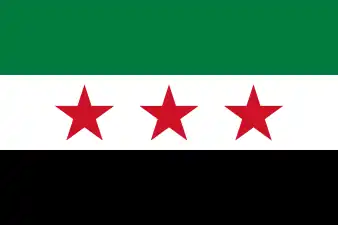| Abbreviation | HNC |
|---|---|
| Formation | 12 December 2015 |
| Purpose | Opposition to the Syrian Government |
| Headquarters | Riyadh |
| Location | |
Region served | Syria |
Chairman/president | Riyad Farid Hijab |
Spokesperson | Riyad Naasan Agha |
Geneva negotiations head | Naser al-Hariri |
| Website | www |
 |
|---|
The High Negotiations Committee (HNC) is an umbrella body which was created to represent the Syrian opposition in the planned Geneva peace talks in 2016.[1] It is led by Riyad Farid Hijab, who was Prime Minister of Syria from June to August 2012. It is considered to be Syria's main or broadest[1] opposition bloc.[2]
History
The HNC was founded in December 2015 at a conference held in Riyadh, Saudi Arabia,[3] which was attended by around 100 delegates.[4] At the end of the conference, a joint statement was issued to confirm the formation of "a High Negotiations Committee for the Syrian Revolution and Opposition Forces (HNC), with its headquarters in Riyadh, to undertake the tasks of choosing a negotiating delegation and to act reference point for negotiators with the representatives of the Syrian regime on behalf of the participants".[5]
The group's chief negotiator, Mohammed Alloush, a member of Jaish al-Islam, resigned from the HNC in May 2016 because of the lack of progress in the Syrian peace process.[6]
In September 2016, the HNC set out a detailed transition plan for Syria, committing the country to democratic and religious pluralism. The 25-page document was launched in London[2] and was welcomed by the United Kingdom's government.[7]
In January 2017, the HNC announced that it will support the Syrian peace talks in Astana, which began on 23 January.[8]
In February 2017, the HNC chief coordinator Riyad Farid Hijab rejected a statement by Staffan de Mistura that the latter will select delegates for the Syrian opposition in Geneva. He also objected to the participation Democratic Union Party (PYD) in the Geneva conference.[9]
The HNC, led by Naser al-Hariri, participated in the Geneva peace talks on Syria (2017).[10]
Criticism
The HNC has faced criticism from Russia because it includes groups like Ahrar al-Sham and Jaysh al-Islam.[11] Its transition plan in September 2016 was also criticized by the opposition Kurdish National Council and the Assyrian Democratic Organization due to it not addressing minority ethnic groups in Syria.[12] The Kurdish National Council withdrew from the HNC on 29 March 2017 in protest to the latter's opposition to federalism and human rights for Kurds in Syria.[13]
Composition
As of December 2015, the HNC included 33 committee members from the following political and military opposition organizations:
- 9 members of National Coalition of Syrian Revolution and Opposition Forces[14]
- Kurdish National Council (2015-2017)[13]
- 5 members of National Coordination Committee for Democratic Change[14]
- 9 independent oppositional figures:[14]
- Louai Hussein, who heads the Building the Syrian State Movement
- Ahmad Jarba, a former National Coalition president
- 11 members of militant rebel factions:
- Free Syrian Army[15]
- Southern Front[14]
- 2nd Coastal Division[14]
- Mount Turkmen Battalion
- Mountain Hawks Brigade[14]
- Ahrar al-Sham[11]
- Jaysh al-Islam[11]
- Ajnad al-Sham Islamic Union[14]
- Free Syrian Army[15]
See also
References
- 1 2 "Russia claims peace talks between Syrian rebels and Assad regime - as the opposition denies all knowledge". The Telegraph. 27 December 2016. Retrieved 30 December 2016.
- 1 2 "Syria's war: HNC unveils road map for transition". Al Jazeera. 7 September 2016. Retrieved 30 December 2016.
- ↑ "Syria peace talks to kick off but key opposition figures wavering". Middle East Eye. 29 January 2016. Retrieved 30 December 2016.
- ↑ Lund, Aron (9 December 2015). "Riyadh, Rumeilan, and Damascus: All You Need to Know About Syria's Opposition Conferences". Retrieved 30 December 2016.
- ↑ "Final Statement of the Conference of Syrian Revolution and Opposition Forces Riyadh (December 10, 2015)". 10 December 2015. Retrieved 30 December 2016.
- ↑ "Chief Syrian rebel negotiator quits in anger at lack of progress towards peace". The Telegraph. 30 May 2016. Retrieved 30 December 2016.
- ↑ Wintour, Patrick (7 September 2016). "Syrian opposition coalition to announce democratic transition plan". The Guardian. Retrieved 30 December 2016.
- ↑ "Syria's main opposition bloc backs Astana peace talks". Al-Jazeera. 15 January 2017.
- ↑ "Syria's main opposition says PYD should not be at Geneva talks". Rudaw. 2 February 2017.
- ↑ Dylan Collins (24 February 2017). "Syria talks hit snag before opening ceremony in Geneva". Al-Jazeera.
- 1 2 3 'Saudi hails Syrian opposition meet ‘breakthrough’'. Al Arabiya News, 12 December 2015. Retrieved 27 January 2016.
- ↑ "Kurds, Assyrians join forces to protect minority rights in Syrian peace talks". Rudaw. 12 September 2016.
- 1 2 "Syrian Kurdish KNC withdraws from Geneva talks in protest at opposition". Kom News. 30 March 2017. Archived from the original on 31 March 2017. Retrieved 31 March 2017.
- 1 2 3 4 5 6 7 Pike, John. "High Negotiations Committee (HNC)". www.globalsecurity.org.
- ↑ "The FSA's demands ahead of Geneva". www.aljazeera.com.